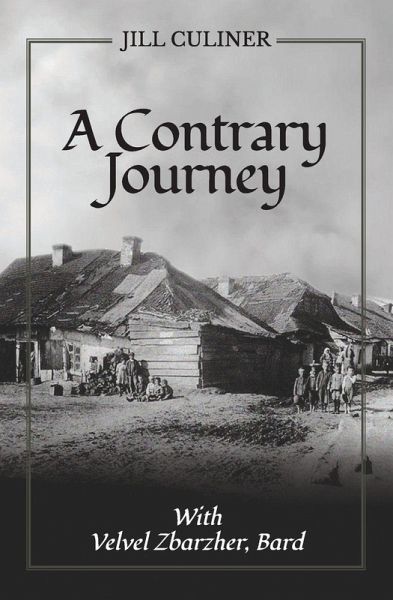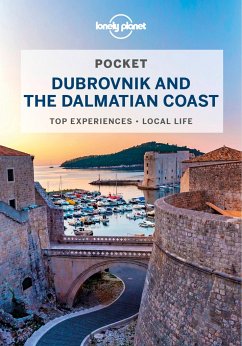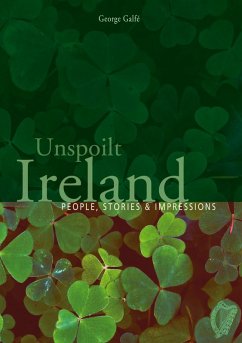
A Contrary Journey with Velvel Zbarzher, Bard

PAYBACK Punkte
10 °P sammeln!
Culiner's intrepid pursuit of the elusive troubadour and the lost world from which he emerged enriches us with a double depiction of the turbulent times and places of the bard's era and the galloping commercialization of our own. Like a chef who manages to document great recipes before they disappear, Culiner serves us an utterly delicious feast of flavours we do not want to lose. Robin Roger, writer, reviewer, Associate Publisher, New Jewish Press 2016-18 Invited by Culiner to join her travels to find Velvel was a gift in isolated pandemic times. Part history, part biography and part literatu...
Culiner's intrepid pursuit of the elusive troubadour and the lost world from which he emerged enriches us with a double depiction of the turbulent times and places of the bard's era and the galloping commercialization of our own. Like a chef who manages to document great recipes before they disappear, Culiner serves us an utterly delicious feast of flavours we do not want to lose. Robin Roger, writer, reviewer, Associate Publisher, New Jewish Press 2016-18 Invited by Culiner to join her travels to find Velvel was a gift in isolated pandemic times. Part history, part biography and part literature, the writing poetically transfixed. Train rides, villages, and Velvel's life move between magical realism and extraordinary insights into Jewish history generally missing in heritage tourism. Daniel J Walkowitz, Professor of History Emeritus, Professor of Social & Cultural Analysis Emeritus New York University, author of The Remembered and Forgotten Jewish World A captivating romance, a thrilling mystery, a fascinating tour back and forward in time, and so much more. Culiner takes us out of the contemporary fast-paced, digital society and superbly redraws the varied contours of the shtetls of Eastern European countries of yore via one remarkable itinerant Jewish existence. The book brilliantly brings back to life the unjustly forgotten Hebrew poet and Yiddish melodrama author, Velvel Zbarzher, a significant precursor of Yiddish theatre that moved from Galicia to Romania, the Russian Pale of Settlement, Austria, and finally Turkey. A breathtaking read! Dana Mihailescu, Associate Professor of American Studies, University of Bucharest What a beautiful book! The writing is clear and direct, the subject matter is interesting and important, and the characters are lively and realistically portrayed. In short, it's a good piece of reporting, and was entirely successful in wafting me to another time and place. Barrington James, former foreign correspondent for the Herald Tribune and UPI, author of The Musical World of Marie Antoinette The Old Country, how did it smell? Sound? Was village life as cosy as popular myth would have us believe? Was there really a strong sense of community? Perhaps it was another place altogether. In 19thc Eastern Europe, Jewish life was ruled by Hasidic rebbes or the traditional Misnagedim, and religious law dictated every aspect of daily life. Secular books were forbidden; independent thinkers were threatened with moral rebuke, magical retribution and expulsion. But the Maskilim, proponents of the Haskalah or Jewish Enlightenment, were determined to create a modern Jew, to found schools where children could learn science, geography, languages and history. Velvel Zbarzher, rebel and glittering star of fusty inns, spent his life singing his poems to loyal audiences of poor workers and craftsmen, and his attacks condemning the religious stronghold resulted in banishment and itinerancy. By the time Velvel died in Constantinople in 1883, the Haskalah had triumphed and the modern Jew had been created. But modernisation and assimilation hadn't brought an end to anti-Semitism. Armed with a useless nineteenth-century map, a lumpy second-hand coat, and an unhealthy dose of curiosity Jill Culiner trudged through the snow in former Galicia, the Russian Pale, and Romania searching for Velvel. But she was also on the lookout for a vanished way of life in Austria, Turkey and Canada. This book, chronicling a forgotten part of Jewish history, follows the life of one extraordinary Jewish bard, and it is told with wry humour by award-winning Canadian writer Jill Culiner.













